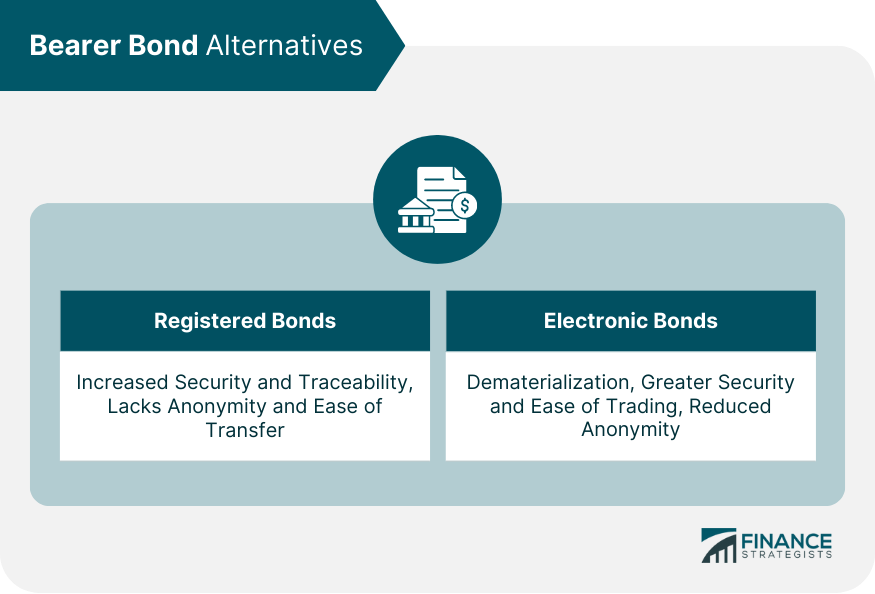A bearer bond is a debt security that is not registered to a specific owner, allowing anyone in possession of the bond to claim ownership and receive interest payments. Bearer bonds have been used since the 1800s as a convenient way to raise capital by governments and corporations. Their popularity declined in the late 20th century due to concerns about tax evasion and money laundering. Bearer bonds offer anonymity and easy transferability, making them attractive to some investors. However, they carry increased risks, such as loss or theft, and are subject to stricter regulatory scrutiny. Bearer bonds do not have a registered owner, which allows for anonymous ownership and transactions, offering privacy to bondholders. The transfer of ownership for bearer bonds is easy, as it only requires the physical delivery of the bond, simplifying the process for buyers and sellers. The physical bond certificate is crucial for bearer bonds, as it represents proof of ownership and the right to claim interest payments. Loss or theft of a bearer bond certificate can lead to permanent loss of ownership, as there is no record of the original owner or a way to recover the lost bond. Bearer bonds pay interest periodically, typically semiannually, which provides bondholders with a steady income stream. Bearer bond certificates often include detachable coupons that must be presented to claim interest payments, serving as proof of entitlement to the interest. To claim interest on a bearer bond, the bondholder must submit the appropriate coupon to the issuer or its agent, usually a bank or financial institution. Some governments, such as the United States, have issued bearer treasury bonds in the past, though they are no longer issued due to regulatory changes. Municipal bonds are debt securities issued by local governments or their agencies, and some of these bonds were once issued in bearer form. Investment-grade bonds are issued by corporations with strong credit ratings, offering relatively lower risks to investors. Bearer bonds of this type have been less common in recent years. High-yield bonds, also known as "junk bonds," are issued by corporations with lower credit ratings and carry higher risks. These bonds are more likely to be issued in bearer form due to the higher yields and anonymity they offer. Zero-coupon bonds are debt securities that do not pay periodic interest but are instead issued at a discount to their face value and redeemed at maturity for the full face value. Bearer zero-coupon bonds are similar to other bearer bonds in terms of anonymity and transferability, but they differ in that they do not require the submission of coupons to claim interest payments. In the United States, the issuance of bearer bonds has been restricted since 1982 due to tax evasion and money laundering concerns, and they are no longer issued by the U.S. Treasury. The European Union has also implemented measures to limit the use of bearer bonds, with many member countries either prohibiting their issuance or applying strict regulatory requirements. Bearer bonds have been associated with money laundering and tax evasion due to their anonymous nature, making it difficult to trace the origin and flow of funds. Governments and international organizations have taken steps to combat the illicit use of bearer bonds by implementing stricter regulations, anti-money laundering measures, and tax reporting requirements. Issuers and holders of bearer bonds must comply with various regulations and reporting requirements, including those related to anti-money laundering, tax evasion, and terrorist financing. Bearer bonds can offer portfolio diversification by providing exposure to different issuers, sectors, and geographical regions, potentially reducing overall portfolio risk. Credit risk is a concern for all bond investors, but it can be particularly significant for bearer bondholders due to the anonymous nature of the securities and the potential for default by issuers. Bearer bonds, like other fixed-income securities, are subject to interest rate risk, as changes in interest rates can negatively impact their market value. Liquidity risk is higher for bearer bonds than registered bonds, as they are less frequently traded and may be more difficult to sell at a favorable price. Investors in bearer bonds must be aware of the tax implications, including the potential for higher taxes and penalties due to non-compliance with tax reporting requirements. Registered bonds are debt securities that have a registered owner, with transactions and ownership changes recorded by the issuer or its agent, providing more security and traceability than bearer bonds. Compared to bearer bonds, registered bonds offer increased security, transparency, and liquidity, but they lack the anonymity and ease of transfer associated with bearer bonds. Dematerialization refers to the process of converting physical bond certificates into electronic records, eliminating the need for physical possession and reducing the risks associated with loss or theft. Electronic bonds offer greater security, ease of trading, and reduced administrative burdens compared to physical bearer bonds, but they do not provide the same level of anonymity and transferability. Bearer bonds are debt securities that offer anonymity and easy transferability but carry increased risks and face stricter regulatory scrutiny. They provide bondholders with the advantages of privacy and simplified ownership transfer through physical possession. Bearer bonds come in various types, including government bonds, municipal bonds, corporate investment-grade bonds, high-yield bonds, and zero-coupon bonds. However, they have faced restrictions and regulatory changes in many countries due to concerns about tax evasion and money laundering. Investors should consider factors such as portfolio diversification, credit risk, interest rate risk, liquidity risk, and tax implications when investing in bearer bonds. Alternatives to bearer bonds include registered bonds, which offer increased security and traceability but lack anonymity, and electronic bonds, which provide greater security and ease of trading but have reduced anonymity.What Is a Bearer Bond?
Features of Bearer Bonds
Anonymity
Transferability
Physical Possession
Coupon Payments

Types of Bearer Bonds
Government Bonds
Treasury Bonds
Municipal Bonds
Corporate Bonds
Investment-Grade Bonds
High-Yield Bonds
Zero-Coupon Bonds

Legal and Regulatory Issues
Bearer Bond Restrictions
United States
European Union
Money Laundering and Tax Evasion Concerns
Illicit Use of Bearer Bonds
Efforts to Combat Illegal Activities
Compliance and Reporting Requirements
Investment Considerations
Portfolio Diversification
Risk and Return Profile
Credit Risk
Interest Rate Risk
Liquidity Risk
Tax Implications
Bearer Bond Alternatives

Registered Bonds
Definition and Features
Comparison With Bearer Bonds
Electronic Bonds
Dematerialization
Advantages and Disadvantages
Final Thoughts
Bearer Bond FAQs
A bearer bond is a debt security that is not registered to a specific owner, allowing anyone in possession of the bond to claim ownership and receive interest payments. In contrast, registered bonds have a registered owner, and ownership changes are recorded, providing more security and traceability than bearer bonds.
Bearer bonds can be attractive to some investors due to their anonymity, ease of transfer, and potential for portfolio diversification. The anonymous nature of bearer bonds allows for private transactions, while their transferability simplifies the buying and selling process.
The main risks associated with investing in bearer bonds include credit risk, interest rate risk, liquidity risk, and the potential for loss or theft. Additionally, investors in bearer bonds must be aware of the tax implications and compliance requirements related to these securities.
Governments have restricted the issuance of bearer bonds due to concerns about money laundering, tax evasion, and terrorist financing. The anonymous nature of bearer bonds makes it difficult to trace the origin and flow of funds, leading to increased regulatory scrutiny and restrictions on their use.
Registered bonds and electronic bonds are alternatives to bearer bonds that offer greater security, transparency, and liquidity. However, these alternatives do not provide the same level of anonymity and transferability as bearer bonds. Dematerialized electronic bonds, in particular, reduce the risks associated with physical possession while maintaining some of the convenience of bearer bonds.
True Tamplin is a published author, public speaker, CEO of UpDigital, and founder of Finance Strategists.
True is a Certified Educator in Personal Finance (CEPF®), author of The Handy Financial Ratios Guide, a member of the Society for Advancing Business Editing and Writing, contributes to his financial education site, Finance Strategists, and has spoken to various financial communities such as the CFA Institute, as well as university students like his Alma mater, Biola University, where he received a bachelor of science in business and data analytics.
To learn more about True, visit his personal website or view his author profiles on Amazon, Nasdaq and Forbes.















